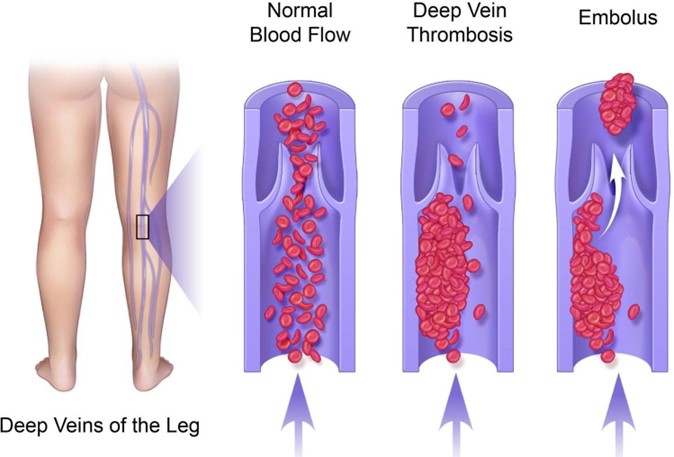The practical nurse reports that a client with a deep vein thrombosis (DVT) was mistakenly given heparin in addition to the prescribed warfarin. Which priority action should the nurse take?
Notify the healthcare provider.
Monitor for signs of bleeding.
Complete an adverse occurrence report.
Obtain blood for coagulation studies.
The Correct Answer is A
Choice A Reason: This is the correct answer because the nurse should immediately inform the healthcare provider of the medication error and the client's condition. The healthcare provider may order antidotes, such as protamine sulfate for heparin and vitamin K for warfarin, to reverse the anticoagulant effects and prevent bleeding complications.
Choice B Reason: Monitoring for signs of bleeding is important but not the priority action for the nurse because it does not address the cause of the problem or prevent further harm. The nurse should monitor the client's vital signs, hemoglobin, hematocrit, and urine output, as well as check for any signs of bleeding, such as bruising, petechiae,
hematuria, hematemesis, melena, or epistaxis.
Choice C Reason: Completing an adverse occurrence report is important but not the priority action for the nurse because it does not provide immediate intervention or treatment for the client. The nurse should complete an
adverse occurrence report after notifying the healthcare provider and implementing appropriate actions. The report should include the details of the error, such as the time, dose, route, and name of the medications involved, as well as the client's response and outcome.
Choice D Reason: Obtaining blood for coagulation studies is important but not the priority action for the nurse because it does not provide immediate intervention or treatment for the client. The nurse should obtain blood
samples for coagulation studies, such as prothrombin time (PT), international normalized ratio (INR), and activated partial thromboplastin time (aPTT), after notifying the healthcare provider and following their orders. The results of these tests can help determine the extent of anticoagulation and guide further therapy.

Nursing Test Bank
Naxlex Comprehensive Predictor Exams
Related Questions
Correct Answer is D
Explanation
Choice A Reason: This action requires assessment and evaluation skills, which are beyond the scope of practice of the PN. The nurse is responsible for providing client education and ensuring that the client understands the discharge instructions.
Choice B Reason: This action requires teaching and evaluation skills, which are beyond the scope of practice of the PN. The nurse is responsible for educating the clients about their prescribed dietary changes and assessing their learning needs and readiness.
Choice C Reason: This action requires critical thinking and decision-making skills, which are beyond the scope of practice of the PN. The nurse is responsible for establishing the blood pressure parameters for client monitoring and adjusting them as needed.
Choice D Reason: This action can be safely delegated to the PN, as it involves reinforcing previous teaching done by the nurse. The PN can review the diet information with the client and answer any questions they may have.
Correct Answer is A
Explanation
Choice A Reason: This intervention is the most appropriate and effective for the nurse-manager to employ, as it provides clear and objective feedback to the staff nurse based on professional criteria, and encourages a positive and constructive approach to enhance the nurse's performance and development.
Choice B Reason: This intervention is not advisable, as it may create a false impression of the staff nurse's performance and fail to address the underlying issues or problems. Documenting the nurse's negative behaviors is important for accountability and improvement purposes, and avoiding it may expose the nurse manager to legal or ethical risks.
Choice C Reason: This intervention is not optimal, as it may demoralize or discourage the staff nurse and create a negative or hostile work environment. Focusing only on the areas of weakness may overlook the strengths and potential of the staff nurse, and may not foster a supportive and collaborative relationship between the nurse- manager and the staff nurse.
Choice D Reason: This intervention is not relevant, as it may divert the attention from the staff nurse's performance and shift the blame to external factors. Discussing how the inconsistency in the staff nurse's performance disrupts the routine of all of the staff members on the unit may not help the staff nurse identify and address their own areas of improvement, and may cause resentment or conflict among the team.
Whether you are a student looking to ace your exams or a practicing nurse seeking to enhance your expertise , our nursing education contents will empower you with the confidence and competence to make a difference in the lives of patients and become a respected leader in the healthcare field.
Visit Naxlex, invest in your future and unlock endless possibilities with our unparalleled nursing education contents today
Report Wrong Answer on the Current Question
Do you disagree with the answer? If yes, what is your expected answer? Explain.
Kindly be descriptive with the issue you are facing.
